Indiegrove is much more than a coworking space. They share a passion for helping entrepreneurs thrive in the community and provide the resources and connections needed to help entrepreneurs build their businesses. Upon walking in, you can tell there’s something different about them that allows them to stand out in comparison to the many coworking spaces that now exist in Jersey City.
Indiegrove considers themselves a “hub for entrepreneurship,” and they follow this by advocating for entrepreneurs, supporting their businesses, and connecting them with other like-minded people. They don’t simply provide a working space, they also actively work toward building a community and being a part of the existing community in Jersey City. With over 200 members working from Indiegrove regularly, it’s clear that their active role in their members’ endeavors are nothing short of incredible.
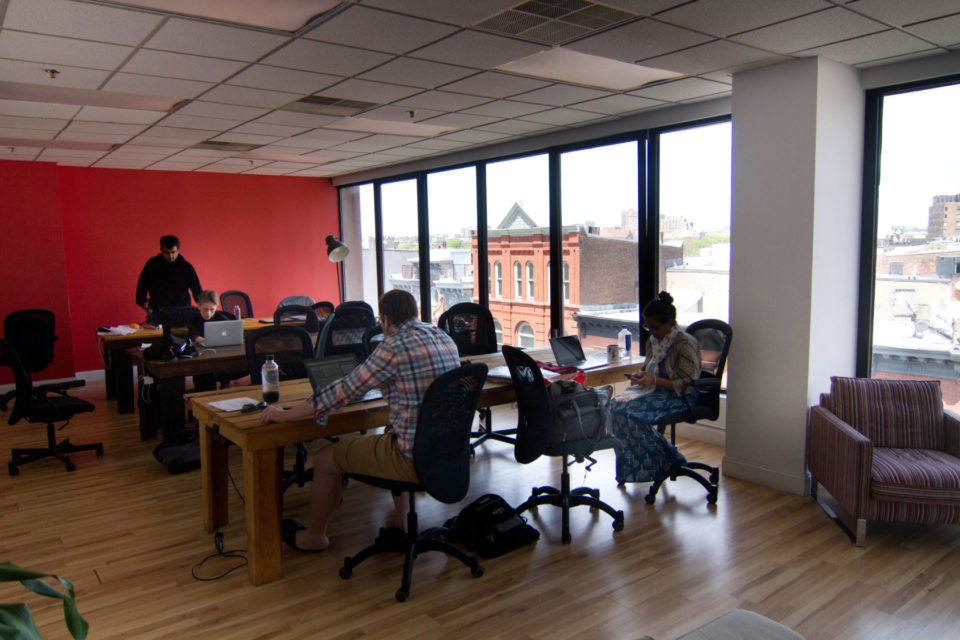
Indiegrove recently sponsored the CCAJC students. We reached out to Indiegrove to see if they could house the CCAJC students for the second part of their semester because they’re centrally located in Downtown Jersey City. They’re a cool co-working office and we knew the kids would feel right at home, be able to explore, and create content in the Downtown area. It’s also easy for mentors to reach due to its convenient location.
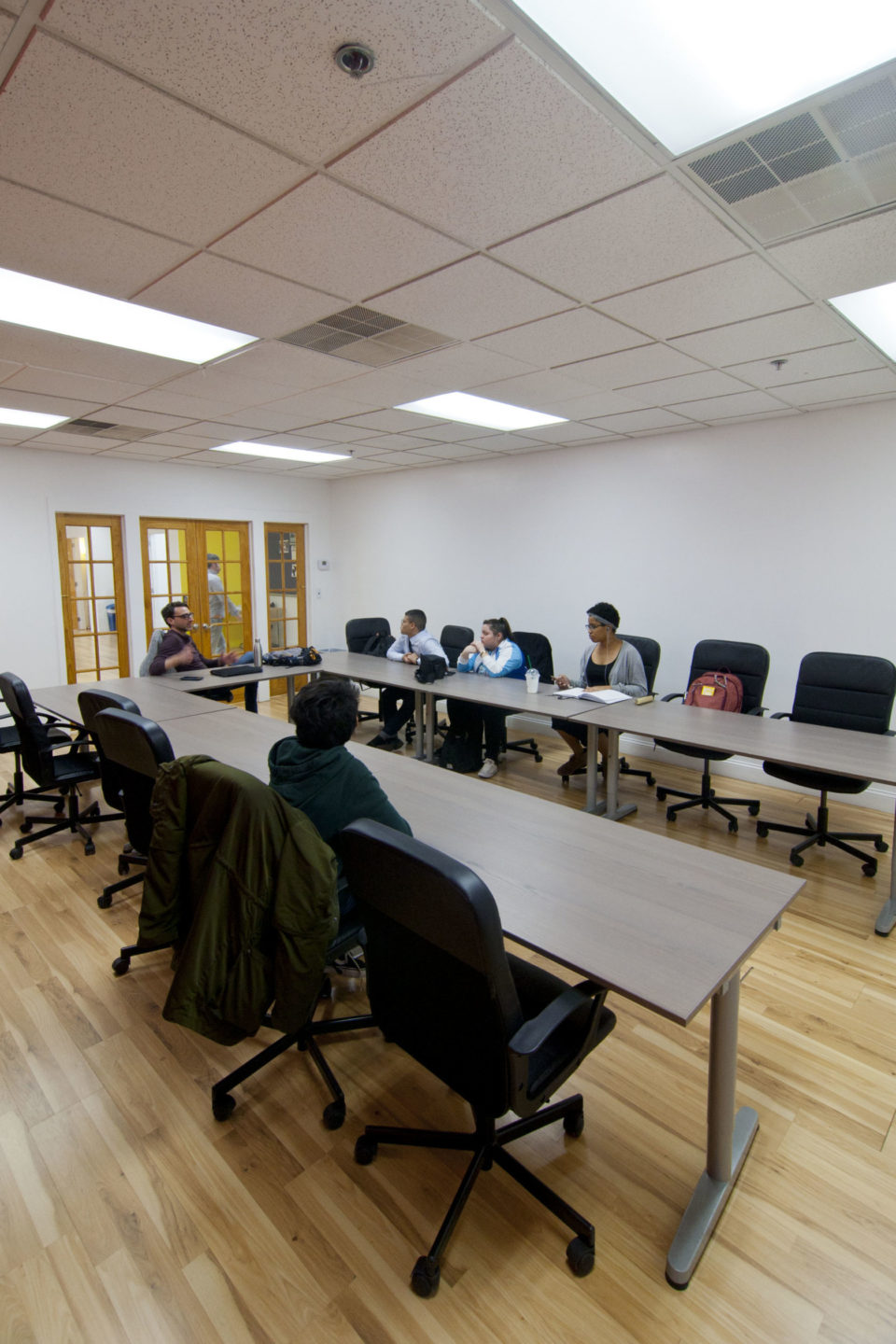
I spoke to Zahra of Indiegrove to learn more about their role in the community and the number of services they offer for local entrepreneurs to create the personalized touch to the coworking world.
What is Indiegrove and how did it start?
Indiegrove is a coworking space. We were the first coworking space in Jersey City. I’ve lived in Jersey City now for almost 12 years. I love this community and what we’re all about. It’s changed a lot, but nevertheless, it still has its soul and that’s the part of it that I love. As I did market research, more and more, I realized that Jersey City was ready for a coworking space and no one had done it yet. At the same time, I wanted to be the first to market as a business advantage. It was kind of crazy because, at the time, it wasn’t the Jersey City that everyone talks about now. People thought I was crazy and most people still didn’t know what coworking was, let alone that we were going to have one in Jersey City. I had worked in economic development and I’ve always thought that business should be a tool for economic justice and equality. That’s where I stand on it. I don’t think it should be a self-serving greed tool. I think it should be something that contributes to community, contributes to society, and contributes to the world. There’s lots of different ways of doing that, but I do think that it levels the playing field for people and gives people opportunities that they may not have otherwise if they didn’t come from a privileged background. They can start a business, anybody can start a business, and that’s what I love about it. For Jersey City at that time, there was still a mix of underserved and privileged that were coming in, so I thought this would be a great way to do that and make sure people who don’t have all the means still have access to a great workspace and can start a successful business. That inspired coworking as what I wanted to do it. From the time I quit my job to the time I opened Indiegrove, it was six months. We opened in January 2013.
What, that’s awesome! How was the growth in the beginning with members?
It was a trickle. One of my friendly competitors came to visit me a week or two after I opened and said, “Don’t let the crickets get to you.” Here I am, I signed this huge lease, I was terrified, I had spent all this money on building the space, and I had made a big deal telling everybody I knew about it. I had gone to events saying, “This is coming.” I opened 6,000 square feet, ready to go, and just had to wait. Thankfully, there’s still a couple of people who are still actually with me that, even before I opened, signed on. I had my first two members before I had even opened my doors, which I’m forever grateful to. Then it was a slow process. Relative to what this could’ve been, looking back on it, it wasn’t that slow but sitting here day-to-day, it was really slow. I was just waiting for customers to come in and doing all of the marketing myself. I had one part-time staff person so when he was here for five hours a day, I would go out and talk to everybody about Indiegrove. We broke even in six months with 50 members. Nobody could believe this was happening, I couldn’t believe it. It took about six months before this space had a personality, that people were actually coming in, but it wasn’t really until a year when the space started to have its own energy. A 6,000 sq ft space is hard to fill.
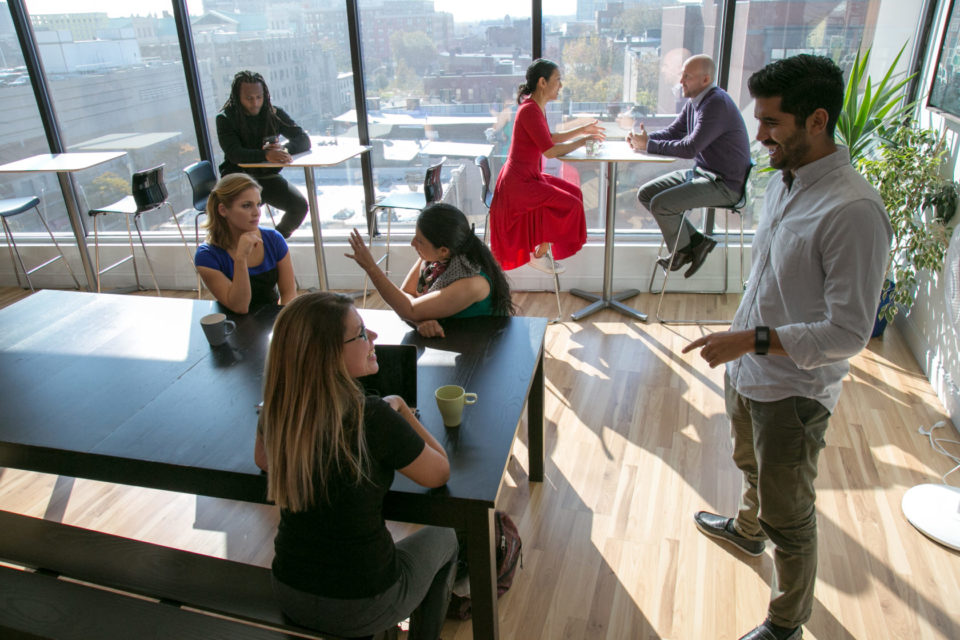
At what point did you come to the realization that you needed more space?
It was a combination of supply and demand. From the very beginning, my offices filled up and my meeting rooms started to get busy even though the coworking space still wasn’t that full yet. At the same time, I had connected with somebody that worked at New Jersey Economic Development Authority and he said, “We’re planning to put together a loan program for coworking specifically in New Jersey for the first time. I would love your help in structuring that program. Advise us on what would be helpful.” I advised him on that, and then I applied. I put in a proposal and I was one of the three people who won. Those two things nicely happened together, where I had a demand for it and then the money became available. The business still wasn’t generating enough cash to fund it within the business. It was about a year into the business that I started to see the funding was coming, I needed more offices and meeting rooms to make the overall business more stable. The first physical expansion happened after two years.
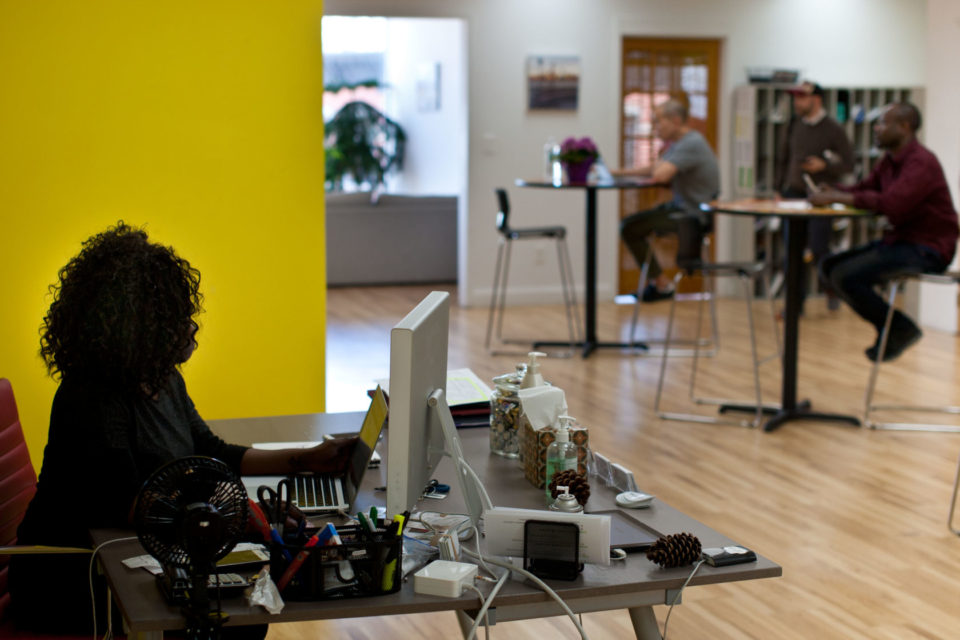
From the beginning to this point, there’s been a lot of growth. Do you think there’s potential to continue growing, perhaps outside of the building?
I think we have a strong brand, a now recognizable brand in Jersey City. A lot of people go, “Oh, you own Indiegrove!” and it’s so cool that they know what that is! I think the brand is definitely strong enough. I have two small children right now, so my priority is them. I don’t have the desire to grow this further into Jersey City. I don’t think Jersey City needs another one. If I were to grow this one day, it’d probably be more on a national scale, which would require travel and all of these other things, which I’m not committed to right now. With that said, I think I’ve proven that, while WeWork has taken over coworking and we’ve had some competition in Jersey City that’s been tough, the boutique model can work. Independent ownership can work. It’s really about how you cater to your customers and understand your customers, and how you tie yourself to your community and build a reciprocal relationship with your community. We’ve done a great job of that. If and when we’re ready one day to take this to another place, we have a great reputation to do that.
There are a lot of coworking spaces in the area now compared to a few years ago. How would you describe the ways Indiegrove stands out? I’ve noticed Indiegrove has a more personal touch to it.
You hit it on the nose. When I opened, I was the only one. It was about proving that coworking is something that can work in Jersey City early on. That was the first hurdle. When competitors started to come in, it was proving that there’s a market for what we do different from everybody else. My whole background is working with entrepreneurs and understanding the mind of an entrepreneur, and I’m an entrepreneur. It’s knowing that they don’t necessarily need free beer at noon, but they do need quiet phone booths that close. It’s knowing what’s really important to someone who’s trying to grow a serious business. We differentiate ourselves by being a space that’s not so much about social or material status, but more about actual growth of business and results that our businesses see. We set ourselves apart with amazing customer service, giving back, and understanding that this is all connected to each other and we have to be a part of our community.
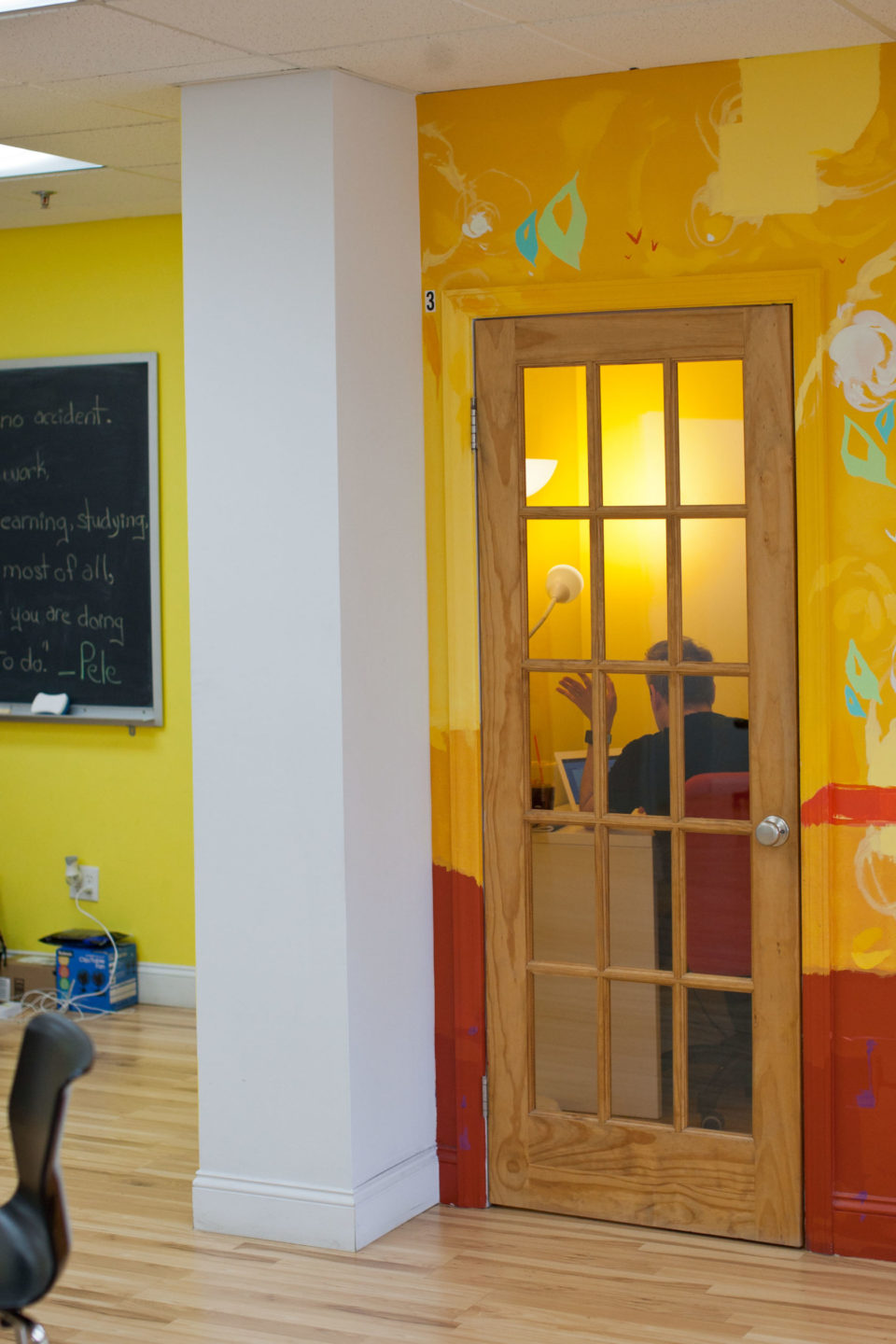
You mentioned how involved you are with the community. Where does that stem from?
I actually started my career in a company called WIBO, which is an entrepreneurial training program. It’s an awesome program that’s still around and has been around since the 1960s. It grew from the Civil Rights Movement. It’s all about serving minorities and women, and that’s where I fell in love with entrepreneurship and knew that this would be my career. We used to go into the poorest neighborhoods of New York City and help people start businesses, and it worked. It would change neighborhoods, it would change their lives, it would change their children’s lives. That’s where I realized that, for a lot of people, the hurdle is not so much the ideas but more the education around financial management, marketing, and things that people from more privileged backgrounds take for granted. From the very beginning, I felt that even though we’re in a privileged community that’s changed, if we want to level the playing field, we should make entrepreneurial education the core of what we do. We offer workshops, lunch & learns, talks, all types of business education. I have a specific skill set because I’ve developed curriculums around these things, I’ve taught classes about these things, and I can bring that to the table. I also work a lot one-on-one with people here. If I hear any hint of, “I don’t even know where to start with a business plan” or “I don’t do my financials because I don’t know how to do it,” I immediately say, “Hey, why don’t we sit down and have a whiteboarding session and try to figure this out together?” Numbers is my big thing, and I feel like that’s what everybody’s scared of. I really try to push people into these areas where they’re not comfortable and force them to take control of their businesses. If you’re going to be successful, the first thing you have to do is take control of your business through the numbers. From the beginning, working with women also was one of my priorities. Coworking is dominated by men. If you go to other coworking spaces, it’s 8 men to 2 women. It’s crazy. I started a women’s group and, in that group, we support and help each other grow our businesses through trainings, education, and advice.
For those workshops and classes, are they only for Indiegrove members or anybody in the community?
Anybody. Often, people who own businesses in the community come. I try to convince more to come, but they’re all busy running their businesses and feel they can’t come. It’s one hour, you can do it. It’s open to anybody. We usually have about half members and half non-members. Members get it for free because it’s part of their membership. Non-members pay anywhere from $5 to $20 for it, so it’s very affordable.
I know you do a lot with the community. Can you tell me more about what you’ve done?
Giving back is a big part of it. It’s not just about business, sometimes you have to give back. From day one, I formed a partnership with Rising Tide Capital because their mission aligns with our mission. I think they’re an incredible organization, and they work in the poorest community of Jersey City. I respect that. I offered my help and they came up with the ideas to use our space for their events and staff orientations, and they wanted people who graduate from their program to have a space and try building out their businesses in a coworking space. I give 6-month scholarships to graduates of their program where they can work here fully for free, and then I give them space for their events. For printing services, we partner with a local organization, Hudson Community Enterprises, that helps disadvantaged and disabled people get into the workforce by helping them learn printing skills. That’s where we print our materials. Our food for big events is only catered by local, independently owned businesses. We are members and partners with HDSID. We hold a food drive every year during the holidays and donate to the Sharing Place, Hudson County’s largest food pantry. It’s these things that we do that tie us to the community. The cool thing is that, over time, our businesses are also their own communities. We have Downtown Community Church that’s been one of our longtime members and they have a huge following in Jersey City. We have JCF Fitness, which is a fitness boot camp that I’ve been personally attending for 6 years but he has his own following. JCFamilies joined Indiegrove in the beginning and is a powerhouse in Jersey City. All of these businesses have their own communities.
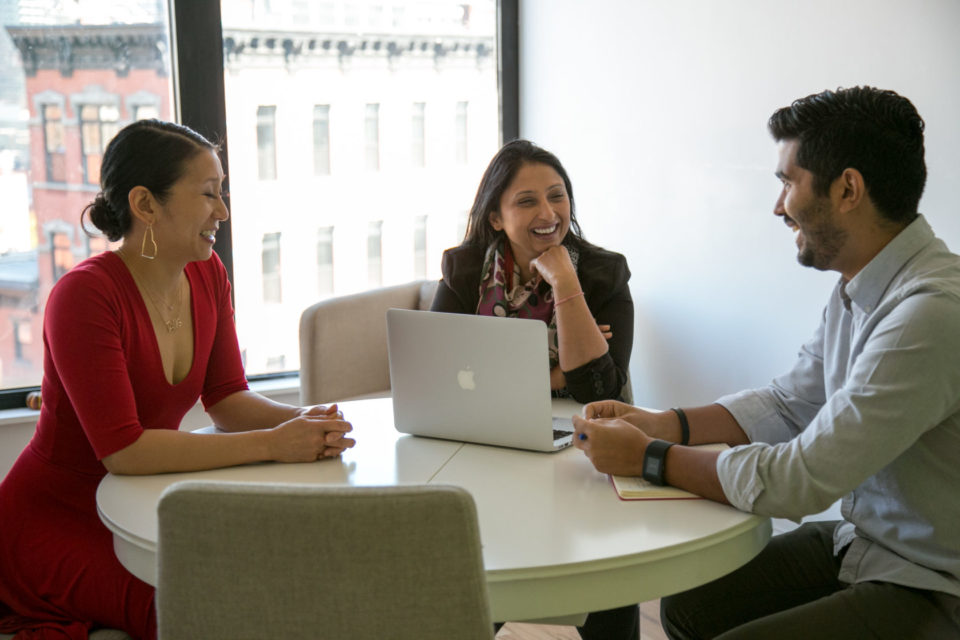
I know we recently had CCAJC and you mentioned you had done a couple of youth or college-based services. I’d love to know more.
We’ve had a couple of programs come here, tour the space, and work from the space. We try to encourage young people to pursue the independent lifestyle, the entrepreneurial lifestyle, and also help them understand what the professional life looks like. In high school, I didn’t know what it meant to be in a professional setting and I’d never been into anything like that. I didn’t come from a privileged background and I’d never worked in an environment like that, so someone took me to work and said, “This is what offices look like.” Somebody else took me to a college and said, “This is what you need to go to.” They immersed me in these things and it sort of changed my life. When young people come here, I say, “This is an option. You don’t have to go the college route. If you don’t have money, this is also something you can do.” We’ve hosted a couple of groups that way.
Are there any services or classes you think you’d want to start?
I did one once that I think I should bring back. It’s called The Art of Business and Passion. It’s about how you can integrate a mission, values, and ethical behavior into business from the start and make sure it stays with you as you grow. I did a 45-minute workshop on it, but I think it can grow into something bigger. The numbers that I do, I’ve done them ad hoc. One time, I did a series that I’d like to build out more on numbers from start to finish in your business. A lot of times, I don’t teach the classes. I lean on other people who have expertise, especially around marketing and technology. They teach the classes, and some of them are members and some are not. For them, they like to give back and it’s also potential customers for them.
That’s amazing! Numbers tend to scare people, so I understand. It’s great that you offer classes so people can learn how to get involved and gain control. How much is a membership at Indiegrove and what does a membership entail?
There are three types of memberships. The first is Coworking, which is our core business. It’s open shared workspace and within that, you have part-time and full-time options, and individual and company options. You can mix those up however you want. People can choose to be here once a week, people can choose to be here 2 or 3 times a week, they can choose to be here every day. We’re a 24/7 facility so that’s one of the things that we offer – no matter whether you’re a night owl or morning person, you can be here at any time. Membership can be anywhere from $100 a month to $350 a month in the Coworking area. Then we have private desks, which are more like designated areas. Those are about $500 a month, and you get your private area. In all of the memberships, you get meeting rooms, mailrooms, copy machines, the Internet, the whole nine. All you have to decide on is how often you want to be here and what kind of chair you want to have. We also have private offices, which are closed-door offices. Those range anywhere from $1100 a month to $3500 a month, depending on how big they are and if they have windows.
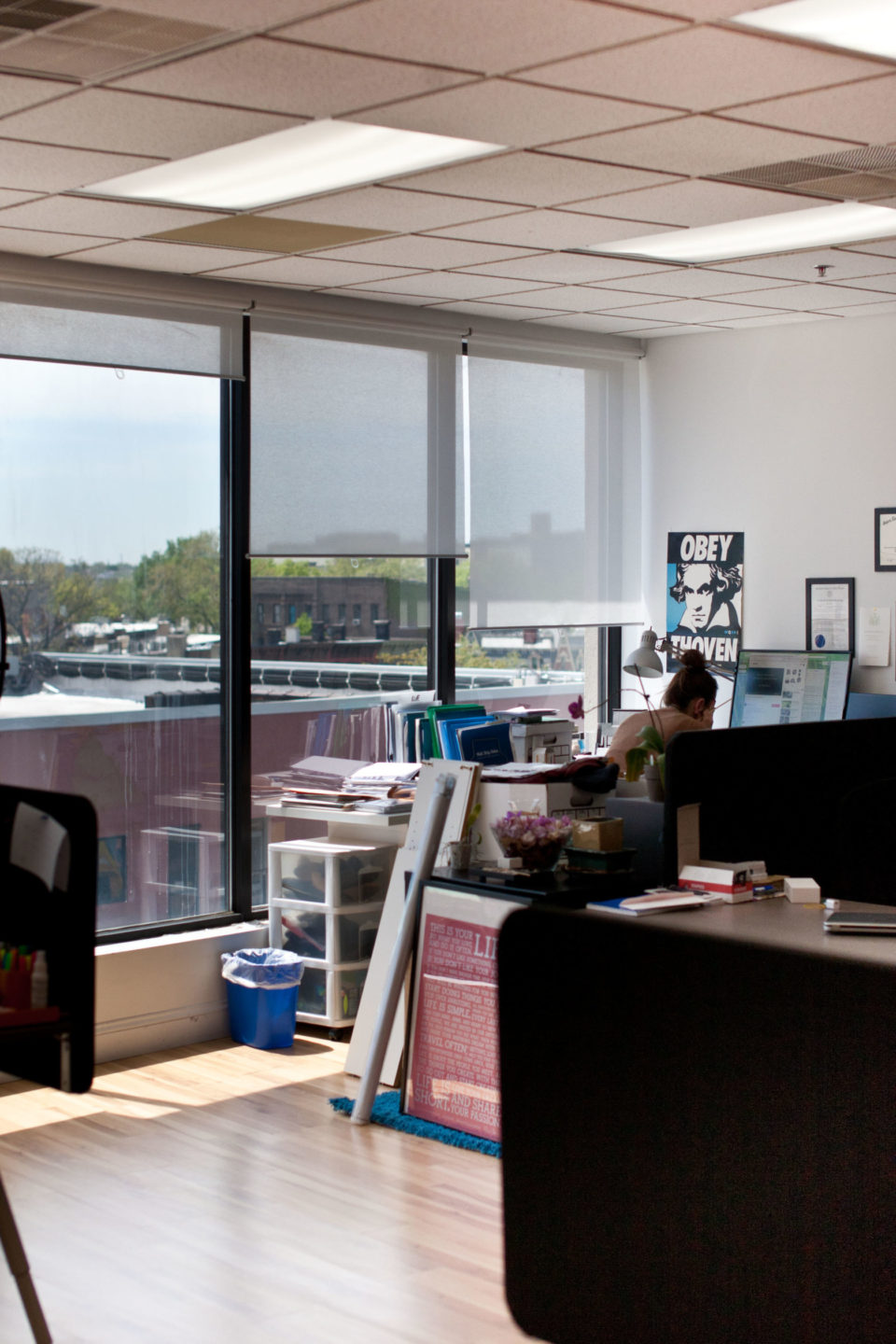
Is there anything else you’d like the community to know about you? I feel like there are still some people who might be new or might not know about Indiegrove.
The most awesome thing we have is our community. It’s the members that we have and, really, it’s great to be around nice people every day. More importantly, from a business perspective, we offer something really unique. There are a lot of these driven people who’ve come here, who are working in this space, gained experience in business, and are really good at what they do. If you’re a new business or even if you have an existing business, to be able to come into that environment on a regular basis and be exposed to that kind of knowledge is a really cool thing. I don’t think people realize just how much the top floors of 121 Newark Ave have to offer. The amount of talent and economic development that’s going on up here in terms of jobs being created and income being generated for the city is incredible. We’re not ground level so people don’t see us, but the businesses up here are making things happen.
Great! Has there been any significant feedback from people, whether or not they still work from this space?
We just won the Members’ Choice Award for Jersey City. That’s really positive feedback. We have amazing reviews online, I do surveys twice a year with all of my members to know what’s going on in the space, and people keep telling me there’s a personal touch here that makes this space special. I try my best to infuse that, but I have an awesome team that helps me do that and community that has been with me from the beginning and helped build that with me. It’s been a collaboration to make this happen.
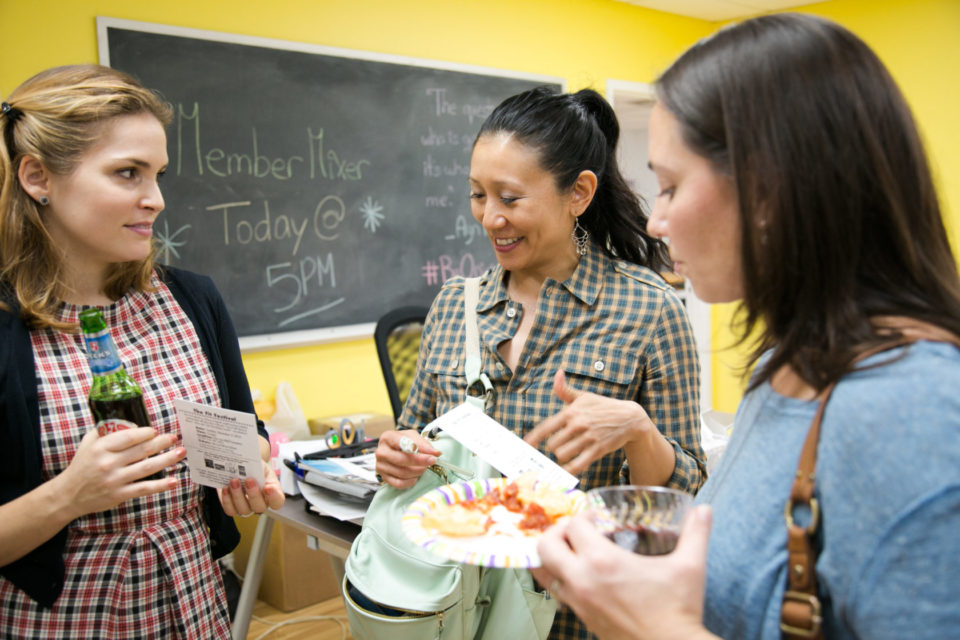
Amazing, thank you so much!
You can find more information and sign up for a membership on their Indiegrove’s website, indiegrovejc.com. You can also follow them on Instagram and Facebook.
Love the vibe and people at Indiegrove!! I have been able to grow my business from a one man shop to 7 private offices and over half a million dollar business in less than 2 years largely because of the access to the Indiegrove community. The people who work out of the space are serious entrepreneurs.